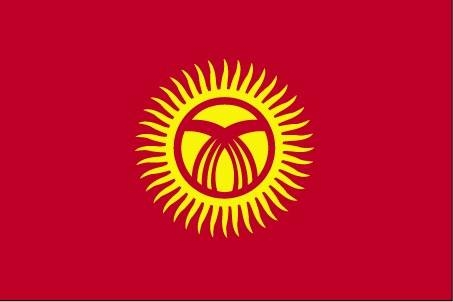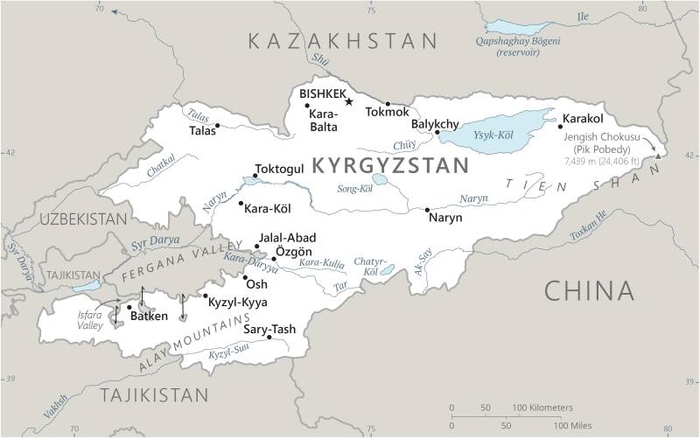149 Kyrgyzstan

Red field with a yellow sun in the center having 40 rays representing the 40 Kyrgyz tribes. On the obverse side the rays run counterclockwise, on the reverse, clockwise. In the center of the sun is a red ring crossed by two sets of three lines, a stylized representation of a “tunduk” – the crown of a traditional Kyrgyz yurt. Red symbolizes bravery and valor, the sun evinces peace and wealth.
Flag courtesy of the CIA World Factbook

Map courtesy of the CIA World Factbook
 A typical Kyrgyz yurt, a portable, bent-wood framed shelter covered by layers of fabric, typically felt.
A typical Kyrgyz yurt, a portable, bent-wood framed shelter covered by layers of fabric, typically felt.
Photos courtesy of the CIA World Factbook
Government
According to Britannica, Kyrgyzstan is a unitary multiparty republic with one legislative house. Its 1993 constitution, which replaced the Soviet-era constitution that had been in effect since 1978, recognized numerous rights and freedoms for citizens. It established legislative, executive, and judicial branches of government and gave the president the ability to implement important policies or constitutional amendments through a national referendum. In 2010, following ethnic clashes and the ouster of Pres. Kurmanbek Bakiyev, a national referendum authorizing a new constitution was passed. It transferred many powers previously held by the president to an expanded parliament and established limits to prevent a single party from dominating the political system. A constitution promulgated in 2021 returned the government to a presidential system and reversed the expanded parliament.
Under the 2021 constitution, the president, who serves as the head of state and government, is directly elected to a maximum of two five-year terms. The president is assisted by a Cabinet of Ministers whose chair must be approved by the legislature. The unicameral parliament has 90 seats. Legislators are elected by party, and only parties that exceed set vote totals in parliamentary elections can seat members in parliament. A separate body of delegates, the People’s Kurultai, presents recommendations to the president and the legislature. The process for selecting delegates is determined by statute. The judicial branch includes local courts and two high courts, the Supreme Court and, for commercial cases, the Supreme Economic Court.
State Civil Aviation Agency (CAA)
The State Civil Aviation Agency (CAA) under the Cabinet of Ministers of the Kyrgyz Republic is an authorized state executive body that forms and implements state policy, ensures coordination, control and strategic development in the field of civil aviation, and also manages the air transport sector.
Airspace
SkyVector – Google Maps – ADS-B Exchange
ICAO countries publish an Aeronautical Information Publication (AIP). This document is divided into three parts: General (GEN), En Route (ENR) and Aerodromes (AD). ENR 1.4 details the types of airspace classes they chose to adopt from classes A through G.
Drone Regulations
Aviation Regulations – Specific Operational Rules
AIR CODE OF THE KYRGYZ REPUBLIC – some UAS law within this document
10) the drone aircraft – the flight vehicle without pilot and unmanned onboard with external management of flight, with take-off mass no more than 10 kilograms and with a flight height no more than 100 meters over terrestrial or surface of the water;
Advanced Air Mobility (AAM) Regulations & Policies
None found by the author.
However, should you, the reader, happen to stumble across something to the contrary, please email the author at FISHE5CA@erau.edu and you may be mentioned in the ACKNOWLEDGEMENTS section of this book by way of thanks for contributing to this free eBook!
Advanced Air Mobility (AAM) News
None found by the author.
However, should you, the reader, happen to stumble across something to the contrary, please email the author at FISHE5CA@erau.edu and you may be mentioned in the ACKNOWLEDGEMENTS section of this book by way of thanks for contributing to this free eBook!
Short Essay Questions
Scenario-Based Question
You have been hired by a Drone Startup Company. Your boss has immediately assigned this job to you.
They need you to prepare a one-page memo detailing the legalities of using a drone to film the yurts, pictured above.
They need you to mention any national laws and local ordinances.
They specifically want to know what airspace (insert pictures) you will be operating in and whether or not you need an airspace authorization.
Does it matter whether or not you are a citizen of the country?
Lastly, there is a bonus for you if, as you scroll through this chapter, you find any typos or broken links!
Short Essay Questions
- What are the drone categories?
- How is registration addressed?
- How is remote ID addressed?
- What are the model aircraft rules?
- What are the commercial drone rules?
- Are there waivers or exemptions to the rules? If so, for what?
- Would you share a link to an interactive airspace map?
- How is BVLOS addressed?
- How can you fly drones at night?
- How can you fly drones over people?
- Where do you find drone NOTAMs?
- What are the rules for drone maintenance?
- What are the rules for an SMS program?
- What are some unique rules not mentioned above?
- What are the C-UAS rules?
- What are the AAM rules?

